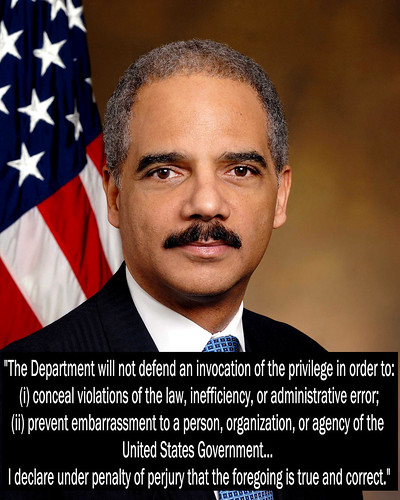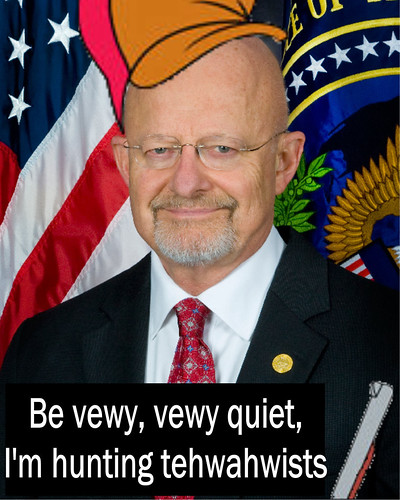Would the US Government executive branch abuse it’s state secrets privilege, abuse the classification of documents, and use its ability to prevent a foreign national’s entry to the US to bar her access to the court system? Would it spend millions of taxpayer dollars on lawyers improperly?
The answer is unequivocally yes.
Would top Obama administration officials practice deceit repeatedly in support of efforts to avoid admission of a simple error?
Absolutely.
Here is proof that the Obama administration at the highest levels cannot be trusted to fairly, prudently and honestly wield the powers they have arrogated unto themselves in the name of national security. Not only are they a pack of liars, they are people that lack the honor and decency to admit when they have made a simple mistake and apologize for it.
How Obama Officials Cried ‘Terrorism’ to Cover Up a Paperwork Error
After seven years of litigation, two trips to a federal appeals court and $3.8 million worth of lawyer time, the public has finally learned why a wheelchair-bound Stanford University scholar was cuffed, detained and denied a flight from San Francisco to Hawaii: FBI human error.
FBI agent Kevin Kelley was investigating Muslims in the San Francisco Bay Area in 2004 when he checked the wrong box on a terrorism form, erroneously placing Rahinah Ibrahim on the no-fly list.
What happened next was the real shame. Instead of admitting to the error, high-ranking President Barack Obama administration officials spent years covering it up. Attorney General Eric Holder, Director of National Intelligence James Clapper, and a litany of other government officials claimed repeatedly that disclosing the reason Ibrahim was detained, or even acknowledging that she’d been placed on a watch list, would cause serious damage to the U.S. national security. Again and again they asserted the so-called “state secrets privilege” to block the 48-year-old woman’s lawsuit, which sought only to clear her name.
 Eric Holder declared to the court that the government would not claim national security privileges to conceal administrative errors or prevent embarrassment.
Eric Holder declared to the court that the government would not claim national security privileges to conceal administrative errors or prevent embarrassment.
Holder should have been charged with perjury for his mendacity and the administration should be beyond embarrassed.
Due to the clerical error committed by the FBI agent, the plaintiff in this case, having recently had a hysterectomy and wheelchair bound, was handcuffed, detained and denied her pain medications for hours. After she was released and returned to her home country, the administration barred her from returning to the US to attend her trial.
Most normal folks after discovering that they have by error caused someone pain, embarrassment and severe inconvenience would find apologizing for their error to be the right thing to do. Apparently the Obama administration is not peopled by normal folks.
The administration almost got away with it. The judge initially dismissed the case basis of the government’s claims. After a federal appeals court reinstated the suit, the judge learned what the government had been at pains to conceal. In a pretrial conference the judge said, “I feel that I have been had by the government.”
From the decision:
At long last, the government has conceded that plaintiff poses no threat to air safety or national security and should never have been placed on the no-fly list. She got there by human error within the FBI. This too is conceded. This was no minor human error but an error with palpable impact, leading to the humiliation, cuffing, and incarceration of an innocent and incapacitated air traveler. That it was human error may seem hard to accept – the FBI agent filled out the nomination form in a way exactly opposite from the instructions on the form, a bureaucratic analogy to a surgeon amputating the wrong digit – human error, yes, but of considerable consequence. Nonetheless, this order accepts the agent’s testimony.
The judge goes on in the ruling to describe some of the various abuses that the Obama administration engaged in to conceal the information from the public on realization that the petty error they had expended so much effort to conceal would be known to the court:
In stubborn resistance to letting the public and press see the details of this case, the government has made numerous motions to dismiss on various grounds, including an overbroad complete dismissal request based on state secrets. When it could not win an outright dismissal, it tried to close the trial from public view via invocation of a statutory privilege for “sensitive security information” (“SSI”), 49 U.S.C. 114(r) and 49 C.F.R. 1520.5, and the “law enforcement privilege.” Roviaro v. United States, 353 U.S. 53, 59 (1957). At least ten times the trial was interrupted and the public asked to leave so that such evidence could be presented.
Given the lengths that this administration has gone to in order to cover up a petty error made during a previous administration, one can only imagine the abuses of office and the national security and secrecy powers that they have arrogated unto themselves to cover up errors serious enough to be called war crimes.
When the Obama administration wielded the full power of the United States to prevent an international investigation of the Bush administration’s war crimes, perhaps his base which claims to care about these things should have paid more attention:
One of the little reported details from the latest batch of Wikileaks material are cables showing that the Obama Administration worked hard behind the scenes not only to prevent any investigation of torture in the United States but shutdown efforts abroad to enforce the Geneva Conventions and the Convention Against Torture. …
American officials pressured government officials, including prosecutors and judges, not to enforce international law and that this was “a very serious matter for the USG.” It was Obama’s own effort at creating a “Coalition of the Unwilling” – nations unwilling to enforce treaties on torture and war crimes when the alleged culprits are American officials. …
Just as many conservatives abandoned their principles in following George Bush blindly, many liberals have chosen to ignore Obama’s concerted efforts to protect individuals accused of war crimes.
 Obama’s “most transparent administration ever” is transparently untrustworthy and abuses the powers of office to cover up errors and crimes great and utterly petty. The powers that it has arrogated unto itself are enormous. Besides the ability to scream 9/11! 9/11! Terrorists are everywhere!, which apparently is all congress and the press need to hear, the president has acquired some of the most extraordinary powers ever granted to the executive:
Obama’s “most transparent administration ever” is transparently untrustworthy and abuses the powers of office to cover up errors and crimes great and utterly petty. The powers that it has arrogated unto itself are enormous. Besides the ability to scream 9/11! 9/11! Terrorists are everywhere!, which apparently is all congress and the press need to hear, the president has acquired some of the most extraordinary powers ever granted to the executive:
The administration has no burden of proof whatsoever to overcome before “disposing” of someone, even an American citizen. … When he ordered the murder of Anwar al-Awlaki, an American citizen without charging him with any crime, and without presenting any evidence to anyone, he avoided questions by hiding behind executive privilege. Only weeks later, Obama ordered another drone strike that killed Awlaki’s 16 year old son, and also refused to answer the serious questions surrounding that strike.
And there are further options:
In December 2011, President Obama signed the 2012 NDAA, codifying indefinite military detention without charge or trial into law for the first time in American history. The NDAA’s dangerous detention provisions would authorize the president – and all future presidents – to order the military to pick up and indefinitely imprison people captured anywhere in the world, far from any battlefield.
This is just too much unaccountable power to be vested in any president.
Would the people who claim to care about justice, civil rights and civil liberties please wake up?
 The article closes with a question:
The article closes with a question:
 Eric Holder
Eric Holder  Obama’s “most transparent administration ever” is transparently untrustworthy and abuses the powers of office to cover up errors and crimes great and utterly petty. The powers that it has arrogated unto itself are enormous. Besides the ability to
Obama’s “most transparent administration ever” is transparently untrustworthy and abuses the powers of office to cover up errors and crimes great and utterly petty. The powers that it has arrogated unto itself are enormous. Besides the ability to 
Recent Comments